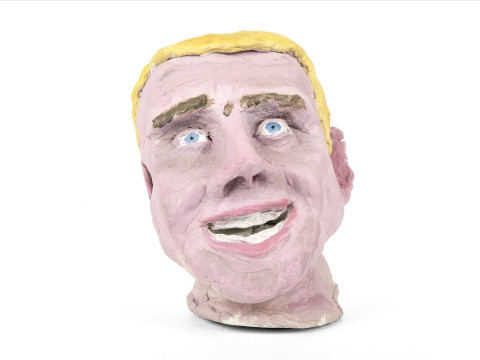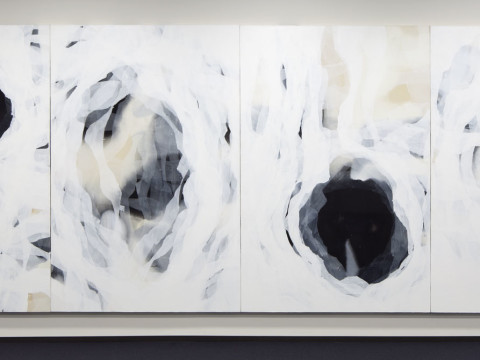
“We listen to the air-raid sirens sounding the start of curfew, as the sun disappears into Palestine.”
By Stephen Farthing RA
Published on 8 April 2020
As part of our 'Artists in Isolation' series, Stephen Farthing RA describes life in locked-down Jordan – how he hopes to finish his next painting before lockdown ends, and how the local call to prayer has been louder since COVID-19.
Each day at 4.30am, the muezzin of our local mosque drags my American diplomat wife, myself, and our two boys from varying degrees of consciousness. The call to prayer is not an unpleasant way to be woken and is in many ways less intrusive than church bells on a Sunday. The call has, however, become much louder than it was before COVID-19. This increase in volume is not in my imagination, by the way. When Jordan’s social distancing strategy forced the mosques to close, King Abdullah instructed mosques to turn up the volume on their external speakers.
We have lived on the top floor of a modern residential block on the edge of Amman, the capital city of Jordan, for the past two years. From my studio on the eastern side of the building, I watch the sun rise over a white stone, five-storey, square-windowed city. At 6pm each evening, from our balcony on the west side of the apartment, we listen to the air-raid sirens sounding the start of curfew as the sun disappears into Palestine.
Within a month of arriving in the desert, the fluidity of time, the sandstorms, its history of occupation, and the tales of the Sultana Scheherazade, started me wondering about, then finally creating, paintings of flying carpets.
In my mind they have become soft drones, delivery systems, magical visitors, perhaps viruses — all camouflaged to resemble soft furnishings. In the minds of my sons they are colourful, mute companions. The room within the apartment that I call my studio, is the place where I spend time each day trying to make sense of where I stand and where I have stood.
With the Saudi Arabian border on our left, the Israeli border on our right, and Egypt clearly visible straight ahead, it was as if we were standing on a map, a flimsy two-dimensional surface, not a solid substrate.
Two months ago, after a two-hour drive north, we paused at the top of a hill in the middle of what was a Roman city, to look down onto the Golan Heights, the Sea of Galilee, and in the distance the mountains of Lebanon — the Holy Land. Three weeks later, we drove south for four hours, through the desert, past Bedouin camps and piles of stones, to the Red Sea and Aqaba, where we found it difficult not to talk about Lawrence of Arabia, Omar Sharif and Gertrude Bell.
With the Saudi Arabian border on our left, the Israeli border on our right, and Egypt clearly visible straight ahead, it was as if we were standing on a map, a flimsy two-dimensional surface, not a solid substrate.
The supermarket delivers food, Nestlé deliver spring water. My wife no longer drives to the embassy for work; that’s now done by email and through conference calls. I paint when I can: childcare, is for now, more important than painting. When the lockdown came, we sent our nanny home to be with her sisters. With that said, I feel blessed to have chosen the vocation that I did. I have never needed to fill my time; all I need is to find the time to get done what I feel I need to do each day. It is, however, much tougher on our boys; they want to swim, run and ride bikes, but haven’t been allowed to leave the house for two weeks. Yesterday, the King announced a continuation of the lockdown until 15 April, but by then we will be just a week away from the month of Ramadan — a time when, once the sun is down, there is no end to the number of communal gatherings. By then I hope to have completed The Last Flight Out of Aqaba, the painting that currently sits centre stage in my studio.
In the meantime, if you're interested to see some flying carpets, look out for me on the RA's Instagram, @royalacademyarts, and my own Instagram, @farthingstephen.

Related articles

Why we need to take child art seriously
27 June 2022

Jock McFadyen RA: postcards from a post-apocalyptic future
28 February 2022



